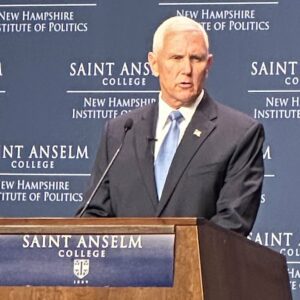In a widely-touted speech at the New Hampshire Institute of Politics Wednesday, former Vice President Mike Pence presented the GOP with a stark choice in the 2024 election: Conservatism or populism?
“Today I ask my fellow Republicans this: In the days to come, will we be the party of conservatism, or will we follow the siren song of populism unmoored to conservative principles?”
Since 2015, with the presidential campaigns of Donald Trump and Bernie Sanders, populism has continued to grow in American politics.
Pitting “the people” against “the elites,” both right-wing and left-wing populist movements have gained favor with the American electorate. That is particularly true among Republican voters, where former President Trump, Florida Gov. Ron DeSantis, and entrepreneur Vivek Ramaswamy — each with a clear populist streak to their respective campaigns — continue to top the polls.
Pence came to the Institute of Politics to push back. He called for “new leadership in the Republican Party,” juxtaposing the populism of other candidates with his commitment to a conservative agenda rooted in the party of Reagan.
“The future of this movement and this party belongs to one or the other, not both,” he claimed. “That’s because the fundamental divide between these two factions is unbridgeable.”
Pence made the case for a traditional Republican who is committed to a strong national defense, limited government, and traditional values as opposed to the populist appeal of candidates like Trump who, Pence said, deviate from these conservative positions.
“The growing faction would substitute our faith in limited government and traditional values with an agenda stitched together by little else than personal grievances and performative outrage,” Pence said.
Pence cautioned voters against those who marginalize the right to life, would use the power of government to push their agenda, and are not serious about tackling traditionally conservative issues like the national debt and entitlement reform.
“Donald Trump’s position on entitlement reform is identical to Joe Biden’s,” he argued.
Pence also drew similarities between the populist rise in the Republican Party and the progressivism dominant within the Democratic Party, saying both “are fellow travelers on the same road to ruin.” In doing so, the knives were out for Trump and others in the GOP primary.
“The truth is Donald Trump, along with his imitators, often sound like an echo of the progressives they seek to replace,” Pence explained. “For instance, they argue that we can only end our crises at home by abandoning our allies abroad. Like progressives, Republican populists insist government should dictate how private businesses operate. And in fact, the governor of Florida still justifies using the power of the state to punish a corporation for taking a political stand that he disagreed with.”
Pence’s appearance did not draw the large crowds that recently showed up at the NHIOP for speeches by Vivek Ramaswamy or Robert F. Kenndy Jr. However, those on hand told NHJournal they were happy to hear a candidate discuss a return to a conservative agenda.
“I just like his traditional conservative values,” said Stephanie Crowe of Manchester, N.H. “And I agree with him. I believe that those are the values that this country needs. I think it’ll stabilize the country, and I think he brings hope.”
“I think his message is certainly what we as a country need,” Robert Schroeder of Hooksett, N.H., told NHJournal.
About the split within the Republican Party that Pence described, Schroeder said, “I think there is certainly a division, and I think that’s unfortunate, and I think it’s non-productive as far as I’m concerned.”
“I appreciated his distinction between the conservatives and the populists, and I think he’s got a valid point there,” Stephanie Crowe added.
Asked what she liked about Pence’s remarks, Martha (who declined to give her last name) of Manchester, N.H., responded, “Limiting government control, and being a strong nation as far as dealing with foreign countries, and I liked his correlations to Reagan,” describing the 40th president as “One of the best in my lifetime.”
But what about Trump? “I didn’t support him in the beginning, and I will not support him now,” Martha told NHJournal. “I think he’s all about himself; he’s not about the country.”
The problem for Pence is, according to poll after poll, the Republican primary electorate is not the Reagan and Bush-era electorate anymore, and those attending his speech appeared to be in the minority of the Republican base today.
In fact, in a poll released this week of likely Republican primary voters in New Hampshire conducted by NMB Research on behalf of the Competitiveness Coalition and The Josiah Bartlett Center for Public Policy, Trump had the highest favorability (65 percent) of presidential candidates listed, with a net favorability of 36 percent.
Similarly, 58 percent and 52 percent of Republicans, respectively, viewed DeSantis and Ramaswamy favorably (each with a net favorability of 26 percent).
Pence, meanwhile, had just a 29 percent favorable rating and a 58 percent unfavorable rating (-29 percent net favorability).
In a New York Times op-ed, pollster Kristen Soltis Anderson described the affinity most Republicans still have toward the former president, writing that “most Republicans aren’t looking to be rescued from Donald Trump. The fact is, they really do like him, and at this point, they think he’s their best shot.”
The crowd for Pence’s speech reflected that reality: Low energy, consisting of many Saint Anselm College students, and not reflective of the broader Republican electorate.
But Pence predicted the demise of the Republican Party should it continue down this populist path. “It may live on in some populist fashion,” he said, “but then it will truly be, in a cruel twist, Republican In Name Only.”




